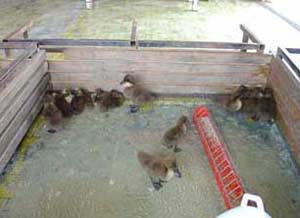Super meat ducks grow very quickly, much faster than traditional ducks. From hatching, they can reach a weight of 3 kilograms in just 2.5 months. In a family, if one person manages about 30 super meat ducks, after 3 months, they can yield nearly 100 kilograms of duck meat. At just 75 days old, these ducks weigh approximately 2.8 – 3.2 kg.
 |
|
Ducking stage (Image: nec-tokin) |
Super meat ducks can lay up to 200 eggs per year, which is about 80 eggs more than traditional ducks. Raising ducks for both meat and eggs is beneficial. In the plains, people typically raise them using intensive farming methods, while in mountainous regions, free-range farming is preferred. Free-range ducks can reach a weight of about 3 kg in 80 days.
To effectively raise ducks, it is advisable to organize the process into 2 stages: the duckling stage and the free-range stage.
– Duckling stage: from day one to 20 days old. During this phase, it is crucial to prepare their feed thoroughly and keep them primarily in the coop. Their diet consists of rice, noodles, crushed corn mixed with shrimp, small fish, crabs, or earthworms. Initially, feed them 5 – 6 times a day. From the 11th day onward, reduce the feeding to about 3 – 4 times a day.
Note: Ensure they receive enough food and nutrients, especially protein, as a deficiency can slow their growth. Start by feeding them soft food. Gradually, you can introduce them to rice, soaked rice, and soaked grains. At 7 – 8 days old, allow the ducklings to gradually get used to water for swimming practice. By the next day, they should swim well.
 |
|
Free-range stage (Image: burwel) |
– After 20 days, let the ducks out of the coop to forage in the fields. It is advisable to time their release so that they can graze after the rice harvest. If the ducks are still hungry, you can supplement their diet with grains and protein-rich food. The banks of rivers, streams, and muddy fields are ideal for grazing. Shrimp, small fish, snails, earthworms, crickets, and various insects are enticing food for ducks. If you wish to raise them for egg production, the process will take longer than raising them for meat. Around the 26th week, the ducks will start laying eggs, and they will stop by the 66th week.
When raising laying ducks, it is important to avoid allowing them to become too fat or stunted. When ducks begin to lay eggs, maintain a lighting period of 17 hours per day. Strictly adhering to this condition is essential for good egg production.
Ducklings should be kept with dry feet when entering the nesting area. They can walk on sawdust, rice husks, or dry sand. Keeping their feet dry helps prevent diseases in the ducklings.
Source: National Agricultural Extension Center, Agricultural Science and Technology


















































